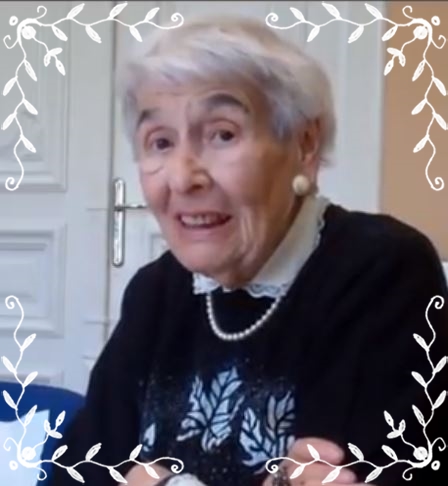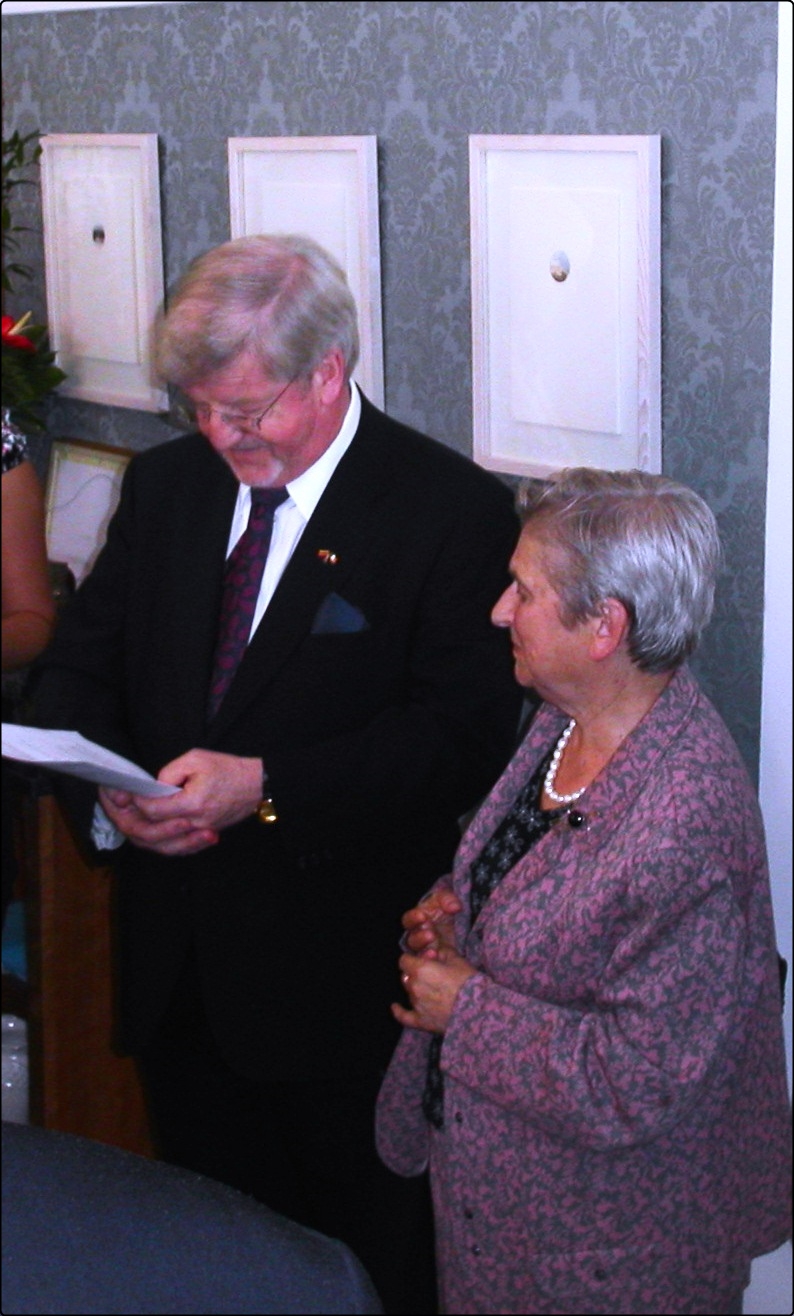צו די שלשים פון יוסף (יאָסקע) מלמד ז″ל
◊
Memories of Joe Melamed Defending History
MORE ON JOE MELAMED (1924-2017)
◊
DEFENDING HISTORY’S JOE MELAMED SECTION. Scroll to end to review upwards in chronological order.
◊
◊
DEFENDING HISTORY’S JOE MELAMED SECTION. Scroll to end to review upwards in chronological order.
◊
◊
Although the scandal caused by statements made by author Rūta Vanagaitė about the partisan leader Adolfas Ramanauskas-Vanagas has by now subsided, the head of the Lithuanian Jewish Community, Faina Kukliansky believes that this is no more than a temporary calm. The English translation of R. Vanagaitė’s book Mūsiškiai should appear soon. Furthermore she has the support of the European Jewish Congress and she has many supporters in Israel.
◊
Не нужно быть великим теоретиком, чтобы заметить разительный контраст между двумя главными «продуктами» последней недели сентября, на которую приходится ежегодная поминальная активность Литвы по чествованию убитых в годы Холокоста литовских евреев – особенно в легендарной столице Литвы, в Вильнюсе. Под «продуктом» мы понимаем культурные события, имевшие вещественное воплощение, артефакты, которые надолго переживут недельное позерство, речи и встречи блестящих государственных чиновников и национальных лидеров.
◊
VILNIUS—Defending History today inaugurated a new section, in the Lithuanian language, on the international efforts calling for restoration of the old Vilna Jewish cemetery at Piramónt and for the Jewish heritage of Vilna and Lithuania to not be defiled by a convention center surrounded by a half millennium of Litvak graves. The convention center project can easily be moved to another appropriate venue. The section aims to provide content stemming from various communities within Lithuania as well as translations of the international outcry over the convention center project.
Vilniaus senosios žydų (Piramonto) kapinės Šnipiškėse
Lietuvių kalba
◊
Neseniai, 5775 žydų kalendoriaus metų Avo mėnesį (2015 m. liepos 16-rugpjūčio 15), buvo hebrajiškai ir angliškai paskelbta rabinų deklaracija dėl senųjų žydų kapinių Vilniuje (tekstas buvo paskelbtas abiem kalbomis 2015 m. liepos 30 d. „Hamodia“ numeryje; liepos 29 d. „Hamodia“ tinklapyje ir liepos 30 d. defendinghistory.com buvo paskelbta apie šį dokumentą).
◊
 VILNIUS—As the first small shipment of Harvard Library’s new book, Catalog of the Leyzer Ran Collection in the Harvard College Library arrived this week in the Lithuanian capital, there was widespread satisfaction that at least a tabulation of the contents of Leyzer Ran’s extensive archive of Jewish Vilna is finally available. The collection was bequeathed to Harvard University where the Library maintains it as a distinct entity with its own name, space, and now, a handsome catalogue brought out by Harvard University. Leyzer Ran (1912-1995) is widely considered to be the primary postwar chronicler of the centuries-old unique Jewish civilization of the city known in Yiddish as Vílne, Yerusholáyim d’Líte — Vilna, Jerusalem of Lithuania. The newly appeared catalogue was compiled and edited by Dr. Charles Berlin, who is Head of Judaica at Harvard Library and Harvard University’s Lee M. Friedman Bibliographer in Judaica.
VILNIUS—As the first small shipment of Harvard Library’s new book, Catalog of the Leyzer Ran Collection in the Harvard College Library arrived this week in the Lithuanian capital, there was widespread satisfaction that at least a tabulation of the contents of Leyzer Ran’s extensive archive of Jewish Vilna is finally available. The collection was bequeathed to Harvard University where the Library maintains it as a distinct entity with its own name, space, and now, a handsome catalogue brought out by Harvard University. Leyzer Ran (1912-1995) is widely considered to be the primary postwar chronicler of the centuries-old unique Jewish civilization of the city known in Yiddish as Vílne, Yerusholáyim d’Líte — Vilna, Jerusalem of Lithuania. The newly appeared catalogue was compiled and edited by Dr. Charles Berlin, who is Head of Judaica at Harvard Library and Harvard University’s Lee M. Friedman Bibliographer in Judaica.
◊
VILNIUS—The Weekly of Vilnius, sometimes considered to be this city’s most prestigious English-language news publication, today released its weekly issue which contains a highly documented summary of many of the sides in the debate over author and PR specialist Ruta Vanagaitė’s comments concerning state plans to name 2018 for someone who led a pro-Nazi militia during the early days of the Lithuanian Holocaust in 1941, but who is being honored for his postwar service in the anti-Soviet resistance. Defending History has published its own take along with a much more limited summary of the debate which readers may consult for comparison and helping “complete the picture” as best as it can be in English. Note that selections of Lithuanian articles on the subject from the major news portal Delfi.lt, and from BNS (Baltic News Service), in both cases generally representing government and “nationalist establishment” positions, are available in English translation on the English Delfi.lt (Lithuania Tribune) site (search “Vanagaitė” for rapid reference).
Renowned Lithuanian-French thinker Algirdas Julius Greimas (1917-1992) was more forthcoming than most about his dubious, or frankly, criminal behavior as a young man.
From his interviews we know that in 1940, he gave public speeches in support of Soviet annexation of Lithuania. And in 1941, he served as an editor for the newspaper Tėvynė in Šiauliai, which repeatedly called for ethnic cleansing of Jews from Lithuania.
◊
Vilnius District Court Judge Rima Bražinskienė’s 29 May 2017 ruling, concerning the “official” Lithuanian Jewish Community’s mid-campaign rule change during last spring’s leadership contest, effectively disenfranchising 2,200 Jewish people of Vilnius (the vast majority of Lithuania’s Jews today) in favor of a new voting system granting effective power over the election to a roomful of “oligarchs” (some of whom have two or three votes each, i.e. two or three times as much weight as the 2,200 Jews disenfranchised) is now publicly available.
The following, for the convenience of our readers, is an English translation. Note that in the case of any query arising, the Lithuanian original is alone authoritative.
◊
In response to a protest from the World Jewish Congress, after the Ukrainian city of Vinnitsa unveiled a statue celebrating nationalist leader Symon Petliura — whose troops killed tens of thousands of Jews in pogroms between 1918 and 1921 — a regional official from the extremist Svoboda party threatened Jewish citizens. In a Facebook rant, the Svoboda official warned Jews opposed to the Petliura statue to fall in line or face the consequences. The Svoboda official stated that “the only time we comfortably coexisted with kikes is Koliyvishchyna,” a reference to an 18th century pogrom against Jews in Ukraine.
Related: Ukraine’s Minister for Infrastructure Plans to Build Actual “Road to Bandera”
YIVO MANIPULATED | JEWISH EVENTS PART OF HOLOCAUST REVISIONIST COVER-UPS
◊
VILNIUS—There was was some surprise this past week in academic circles focused on East European Jewish history and culture and Yiddish studies, after a 24 October press release issued by Yivo in New York featured this quote by Professor David E. Fishman of New York’s Jewish Theological Seminary: “The troves discovered in Lithuania are the most important body of material in Jewish history and culture to be unearthed in more than half a century, since the discovery of the Dead Sea Scrolls.” The press release was widely published in major publications internationally. Queries to staff at Lithuania’s National Library quickly revealed that these items were in fact discovered in the early 1990s and have been in the collection all along, but were being recycled for PR as “new discoveries” for political, fundraising and public relations reasons. Not one of them is seen to be “narrative changing” in the annals of Lithuanian Jewish history. The scenario becomes more disturbing to some in the context of Yivo’s director actively joining the Lithuanian government’s “Commission for the Evaluation of the Crimes of the Nazi and Soviet Occupational Regimes of Lithuania) which has spearheaded the Prague Declaration and other European attempts to have Nazism and Communist declared to be absolutely equal, a major component in current Holocaust obfuscation emanating from the far right in the Baltic States. One of the last Vilna-born Holocaust survivors still alive has published a public letter to Yivo’s director.
◊
See Defending History’s Joe Melamed section
◊
In a 2012 article in Defending History, I asked why Holocaust perpetrator Jonas Noreika is made into a “national hero” here in Lithuania, one honored by street names and public plaques. Since then protests have come, among others, from a somewhat obscured petition by Lithuanian intellectuals, an appeal from journalist and Declaration of Independence signatory Rimvydas Valatka, Lithuania’s official Jewish community, Grant Gochin, a South African born author resident in the United States, and others. These appeals, all from 2015, were crowned by a rare protest by Jewish students at a Noreika shrine in central Vilnius (see Defending History’s guide for English readers to the links in the 2015 debate).
◊

Chasia Langbord Shpanerflig. Zhetl (Diatlava) 1921 — Vilnius 2017. Photo © DefendingHistory.com
VILNIUS—At Sabbath services at Vilnius’s Choral Synagogue this morning, word began to spread that Vilnius’s oldest surviving veteran of the Jewish Partisans, Chasia (Khásye) Langbord Shpanerflig, had passed away at the age of 96.
◊
Nearly a decade after  HE Dónal Denham’s 3 June 2008 historic reception for Fania Brantsovsky, a hero of the Holocaust-era anti-Nazi Jewish partisan resistance in Lithuania, held at the Irish Ambassador’s Residence in Vinius, the text of his speech has been released. It appears below. See our report on the June 2008 event. Historical note: Defending History believes it was the first time since collapse of the Soviet Union that Western embassies in one of the new democracies saw a need to honor a person who was being unjustly targeted by state prosecution services and other national elites. The American, Austrian, British, French, German, Norwegian and other embassies followed the Irish lead.
HE Dónal Denham’s 3 June 2008 historic reception for Fania Brantsovsky, a hero of the Holocaust-era anti-Nazi Jewish partisan resistance in Lithuania, held at the Irish Ambassador’s Residence in Vinius, the text of his speech has been released. It appears below. See our report on the June 2008 event. Historical note: Defending History believes it was the first time since collapse of the Soviet Union that Western embassies in one of the new democracies saw a need to honor a person who was being unjustly targeted by state prosecution services and other national elites. The American, Austrian, British, French, German, Norwegian and other embassies followed the Irish lead.
VILNIUS—In comments reported today by the Lithuanian press service ELTA, the nation’s prime minister, Saulius Skvernelis has announced and hailed the decision to proceed with a national convention center in the heart of the old Vilna Jewish cemetery as one that “will lift the Lithuanian capital to a higher level of competitiveness in tourism.” He also notes that “the lack of a modern congress center in Vilnius is the main obstacle for the development of conference tourism in Lithuania,” not mentioning that there are numerous alternative sites for much more rapid and hassle-free construction of such a center.
◊
◊
◊
What makes Rūta Vanagaitė’s Ours (Mūsiškiai) very different from all other Lithuanian books on the Holocaust is that it was from the start written as a bestseller. Written by an experienced public relations professional as an appeal to the Lithuanian public, the book raises the painful issue of historical responsibility. The author does not refrain from giving a personal twist to the story (it would be impossible otherwise, as the Holocaust is an issue of individual position and individual responsibility). The author is piercingly direct and uses black comedy. She approaches the topic with composure and a sense of supremacy. These two features may irritate the reader. However, she is entitled to it as she aims to confront the reader, which she so eloquently achieves.